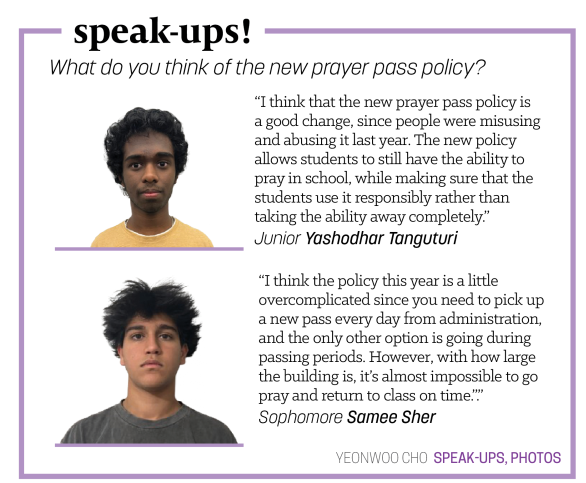Starting this year, administrators enacted a revised policy regarding students who need to pray at school. The new policy states that students must receive a pass each day from the administration. Students then only have a five-minute time frame from when they leave to return to class. This is a contrast from previous years, where students would receive a pass for the whole year and did not have a time restriction.

The new policy puts an unnecessary strain on students that need to pray during school hours due to religious reasons. Instead of focusing on prayer, students may be forced to only think about how quickly they can finish to return to class on time. The policy also makes it harder on teachers since they’ll have to disrupt their class time to see if students have surpassed the five minute mark.
Although the worry of students abusing these passes is valid, those students represent a small minority, and the majority should not be punished for the transgressions of a few. We acknowledge that the school has to take the necessary precautions when there are issues like these, but it would be easy enough to identify the few students who abused the privilege rather than creating a blanket policy for all.
Another issue with the five minute time limit is that it would be nearly impossible to pray. You have to get a new pass each day from administration, then walk from wherever your class may be to the library, pray and then get back in time. Simply put, it’s not physically possible. The administration must be more understanding and sensitive regarding students who need to pray.

The First Amendment of the Constitution protects a student’s right to religious expression in school. We understand that under certain U.S. Supreme Court rulings, schools are not allowed to impose religious beliefs on students, even if students are not required to participate. However, rulings have also determined schools may not prohibit students from practicing their religions as long as it does not cause a disruption. If a student needs more than five minutes to pray, it is not a disruption, it is simply exercising their right to religious expression.
Overall, it is important for administrators to realize that enacting these new policies is not supporting students or teachers. Simply, it’s putting them under more strain and pressure, which is not what school should be doing. The current revised policy unfairly punishes the majority of students who follow the rules and does not at all give enough time for students to pray. Administrators should change the current policy back to the original form.

































![AI in films like "The Brutalist" is convenient, but shouldn’t take priority [opinion]](https://hilite.org/wp-content/uploads/2025/02/catherine-cover-1200x471.jpg)










































![Review: “The Immortal Soul Salvage Yard:” A criminally underrated poetry collection [MUSE]](https://hilite.org/wp-content/uploads/2025/03/71cju6TvqmL._AC_UF10001000_QL80_.jpg)
![Review: "Dog Man" is Unapologetically Chaotic [MUSE]](https://hilite.org/wp-content/uploads/2025/03/dogman-1200x700.jpg)
![Review: "Ne Zha 2": The WeChat family reunion I didn’t know I needed [MUSE]](https://hilite.org/wp-content/uploads/2025/03/unnamed-4.png)
![Review in Print: Maripaz Villar brings a delightfully unique style to the world of WEBTOON [MUSE]](https://hilite.org/wp-content/uploads/2023/12/maripazcover-1200x960.jpg)
![Review: “The Sword of Kaigen” is a masterpiece [MUSE]](https://hilite.org/wp-content/uploads/2023/11/Screenshot-2023-11-26-201051.png)
![Review: Gateron Oil Kings, great linear switches, okay price [MUSE]](https://hilite.org/wp-content/uploads/2023/11/Screenshot-2023-11-26-200553.png)
![Review: “A Haunting in Venice” is a significant improvement from other Agatha Christie adaptations [MUSE]](https://hilite.org/wp-content/uploads/2023/11/e7ee2938a6d422669771bce6d8088521.jpg)
![Review: A Thanksgiving story from elementary school, still just as interesting [MUSE]](https://hilite.org/wp-content/uploads/2023/11/Screenshot-2023-11-26-195514-987x1200.png)
![Review: "When I Fly Towards You", cute, uplifting youth drama [MUSE]](https://hilite.org/wp-content/uploads/2023/09/When-I-Fly-Towards-You-Chinese-drama.png)
![Postcards from Muse: Hawaii Travel Diary [MUSE]](https://hilite.org/wp-content/uploads/2023/09/My-project-1-1200x1200.jpg)
![Review: "Ladybug & Cat Noir: The Movie," departure from original show [MUSE]](https://hilite.org/wp-content/uploads/2023/09/Ladybug__Cat_Noir_-_The_Movie_poster.jpg)
![Review in Print: "Hidden Love" is the cute, uplifting drama everyone needs [MUSE]](https://hilite.org/wp-content/uploads/2023/09/hiddenlovecover-e1693597208225-1030x1200.png)
![Review in Print: "Heartstopper" is the heartwarming queer romance we all need [MUSE]](https://hilite.org/wp-content/uploads/2023/08/museheartstoppercover-1200x654.png)




